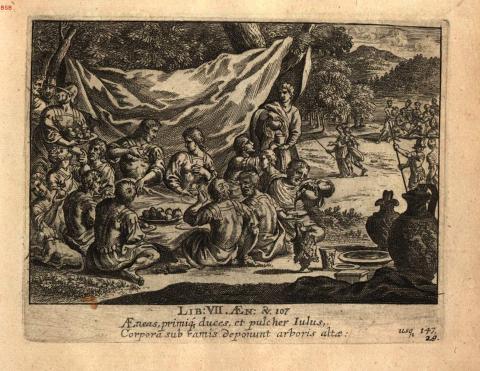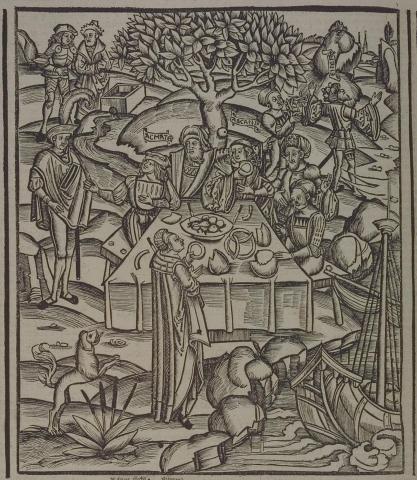CORE VOCABULARY
Aenēās, ae, m.: 1. A Trojan chief, son of Venus and Anchises, and hero of the Aeneid, 1.92. 2. Aenēās Silvius, one of the Alban kings, 6.769.
Iūlus, ī, m.: Iulus or Ascanius, son of Aeneas, 1.267, et freq.
rāmus, ī, m.: a branch, bough, 4.485, et al.; limb, 8.318; wreath, 5.71.
dēpōnō, posuī, positus, 3, a.: to put down or aside; recline, 7.108; put off, from, put on shore, 5.751; lay down, lay, 6.632; lay aside, dismiss, banish, 2.76; (pass., of sickness), to be laid down, dying, despaired of, 12.395.
īnstituō, uī, ūtus, 3, a.: to fix in a place; put down, plant, step with, 7.690; found, inaugurate, 6.70; w. inf., ordain, 6.143; prepare, begin, 7.109; teach. (1. in and statuō)
daps, dapis, f.: a feast, banquet, 1.210; food, viands, 1.706; flesh of sacrificial victims, 6.225; usually found in the pl., but the gen. pl. is not used.
adōreus, a, um: adj. (ador, spelt), of spelt or fine wheat, 7.109.
lībum, ī, n.: a cake of meal, oil, and honey, used in sacrifice. (lībō)
herba, ae, f.: any grassy or herbaceous growth; grass, turf, 1.214, et al; fodder; herb, plant, 3.650; grassy land, pasture, meadow, 3.221; a plant.
subiciō, iēcī, iectus, 3, a.: to cast, throw, place or put under, 2.236; (fig.), to excite, kindle, 12.66; to subjoin, utter in reply, answer, 3.314; p., subiectus, a, um, cast under, put under, 6.223; situated under, bowed, bending, 2.721; put down, subdued, conquered, 6.853. (sub and iaciō)
epulae, ārum, f.: a banquet, feast, 1.79; food, 1.216. (sing. epulum)
Iuppiter, Iovis, m.: Jupiter, son of Saturn and Rhea, and king of the gods, 1.223; Iuppiter Stygius, Pluto, 4.638.
Cereālis, e: adj. (Cerēs), of Ceres; pertaining to Ceres or to grain; Cereālia arma, utensils for preparing grain or making bread; instruments of Ceres, 1.177.
solum, ī, n.: the bottom or ground of anything; soil, earth, ground, 1.367, et al.; land, 3.698; foundation, 10.102; the water beneath a ship, as its support; the water, sea, 5.199; support, table, 7.111.
pōmum, ī, n.: any kind of tree fruit; an apple, pear, fig, etc., freq.
agrestis, e: adj. (ager), pertaining to the fields or country; country-, rustic, rural, 3.34; wild, 7.111; subst., agrestis, is, m., a rustic, 7.504; husbandman.
morsus, ūs, m.: a biting; eating, 3.394; tooth, 7.112; fang, 2.215; gripe, hold, 12.782; fluke, 1.169. (mordeō)
exiguus, a, um: adj. (exigō), minute, scanty, little; insignificant, small, 4.212; few, 5.754; thin, slender, feeble, 6.493.
Cerēs, eris, f.: daughter of Saturn and Ops, and goddess of agriculture; (meton.), corn, grain, 1.177; bread, 1.701; cake, loaf, 7.113; Cerēs labōrāta, bread, 8.181.
pēnūria, ae, f.: want, destitution, need, 7.113.
adigō, ēgī, āctus, 3, a.: to drive, take, bring to, 9, 601; thrust, 9, 431; to strike down, hurl, 4, 25; force, urge, impel, with inf., 6, 696; drive, 10, 850. (ad and agō)
violō, āvī, ātus, 1, a.: to exercise force upon; hurt, wound, 11.277; break, 7.114; devastate, 11.255; desecrate, profane, 2.189; stain, 12.67. (vīs)
manus, ūs, f.: the hand, 1.487; freq.; (meton.), action, movement of the hand; work, art, handiwork, 3.486; prowess, heroic deed, action, 2.434; force, violence, 2.645; a collection of persons; a band, crew, troop; an army, 2.29; forces, 5.623; multitude, 6.660; pl., manūs, workmen, 11.329; dare manūs, to yield, 11.558; extrēma manus, the finishing hand or touch, 7.572.
māla, ae, f.: the cheek bone, jaw, 5.436; pl., mālae, cheeks, 9.751; teeth, 3.257.
fātālis, e: adj. (fātum), fated, 4.355; of fate or destiny, 2.165; sent by fate, 12.232; fraught with fate, destructive, calamitous, deadly, fatal, 12.919.
crūstum, ī, n.: a crust, 7.115.
patulus, a, um: adj. (pateō), opening, wide; wide, broad.
nec or neque: (adv. and conj.), and not; neither, nor, 1.643, et al.; in prohibition, 3.394, et al.; neque (nec) — neque (nec), neither — nor, 5.21, et al.; nec — et, or -que, may be rendered neither — nor, 12.801; 2.534; nec nōn, and also, nor less, 6.183; nec nōn et, and also, 1.707.
quadra, ae, f.: anything quadriform; one of the equal quarters of a wheaten loaf or cake, 7.115. (cf. quattuor)
heus: (interj.), ho! hilloa! lo there! 1.321, et al.
adlūdō, lūsī, lūsus, 3, n.: to speak playfully; sport, mock, jest, 7, 117.
atque, or ac: (conj.), and in addition, or and besides; and, as well, and indeed, and, 1.575; freq.; even, 2.626; in comparisons, as, 4.90; than, 3.561.
stupefaciō, fēcī, factus, 3, a.: to amaze, stupefy, astound, bewilder, 5.643; surprise, 7.119. (stupeō and faciō)
continuō: (adv.), immediately, straightway. (continuus)
salveō, 2, n.: to be well; imperative, all hail! hail! 5.80. (salvus, safe)
ō: (interj. expressing joy, grief, astonishment, desire, or indignation), O! oh! ah! w. voc., 2.281, et al.; w. sī and the subj., oh that, 11.415; sometimes placed after the word to which it relates, 2.281.
fīdus, a, um: adj. (fīdō), trustworthy, faithful, trusty, 1.188; safe, secure, hospitable, 5.24; w. gen., tuī fīdissima, most faithful to thee, 12.659.
Trōia, ae, f.: 1. Troy, the capital of the Troad, 2.625, et al. 2. A city built by Helenus in Epirus, 3.349. 3. A part of the city of Acesta in Sicily, 5.756. 4. The name of an equestrian game of Roman boys, 5.602.
Penātēs, ium, m.: gods of the household; hearth-, fireside gods, 2.514, et al.; tutelary gods of the state as a national family, 1.68; (fig.), fireside, hearth, dwelling-house, abode, 1.527. (penus)
genitor, ōris, m.: he who begets; father, sire, 1.155, et al. (gignō)
Anchīsēs, ae, m.: son of Capys and Themis, and father of Aeneas by Venus, 2.687, et al.
arcānus, a, um: adj. (arca), hidden, secret, 4.422; subst., arcānum, ī, n., a secret, 1.262.
ignōtus, a, um: (adj.), unknown, 1.359; strange, 5.795; not well known, but little known, 11.527.
accīdō, cīdī, cīsus, 3, a.: to cut into, or up; cut, 2.627; eat into, devour, consume, 7.125. (ad and caedō)
defessus, -a, -um: wearied, tired, fatigued, 1.157. (dēfetīscō)
meminī, isse, def. a. and n.: (w. acc., gen., or inf.), to have in mind; remember, be mindful, recollect, 1.203; distinguish, 3.202. (rel. to mēns)
locō, āvī, ātus, 1, a.: to place, put, 1.213, et al.; lay, 1.428; found, 1.247. (locus)
mōlior, ītus sum, 4, dep. a. and n.: to pile up; build, erect, construct, 1.424; plan, undertake, attempt, 2.109; pursue, 6.477; cleave, 10.477; contrive, devise, 1.564; occasion, 1.414; prepare, equip, 4.309; arrange, adjust, 12.327; of missiles, discharge, hurl, 10.131. (mōlēs)
agger, eris, m.: materials gathered to form an elevation; a heap of earth or stones, dike, embankment, bank, 1.112; 2.496; heap of earth, 9.567; top, summit, ridge, raised surface, 5.44, 273; a rampart, 9.769, et al.; a height or rising ground, 12.446; aggerēs, mountains, mountain ramparts, 6.830. (aggerō)
exitium, iī, n.: a going out; death; hardship, 7.129; destruction, downfall, ruin, 2.131. (exeō)
modus, ī, m.: a method, 4.294; mode, manner, way, 1.354, et al.; a measure, of song, measure, strain, note, 7.701, et al.; bound, limit, end, 4.98, et al.; fashion, of building, 11.328; abl., modō, in the manner or fashion; like, 9.119.
quārē: (adv. interrog. and rel.), on account of what thing? why? wherefore? on account of which thing, for which reason, wherefore, 1.627. (abl. of quī and rēs)
age, agite: (imperat. of ago), onward! away! come on!
vestīgō, 1, a.: to track; trace, explore, search; seek out, hunt, 12.467; 6.145; descry, 12.588.
portus, ūs, m.: a port, harbor, haven, 1.159, et al; (fig.), 7.598.
patera, ae, f.: a broad, saucer-shaped dish, used in making libations; a libation cup, patera, 1.729. (pateō)
lībō, āvī, ātus, 1, a.: to taste, sip; to touch lightly; kiss, 1.256; pour out as a drink offering, 1.736; make a libation, 3.354; (w. acc. of the object on which the libation is poured), to pour libations on, 12.174.
repōnō, posuī, positus (postus), 3, a.: to lay, place, put back, replace, 3.231; lay aside or down, 5.484; put, lay up, store away, w. abl., 4.403; lay, deposit, place, 6.220; w. dat., 11.594; restore, w. in and acc., 1.253; return, repay, 12.878.


